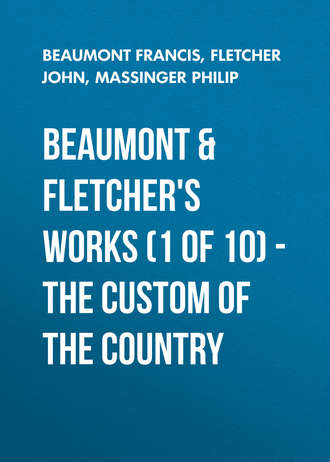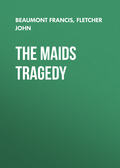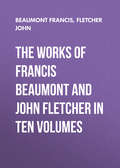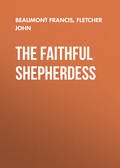
Fletcher John
Beaumont & Fletchers Works (1 of 10) – the Custom of the Country
Gover. Fair Hippolyta, I am come to ease you of a charge.
Hip. I keep none I count a burthen Sir: and yet I lye too.
Gover. Which is the Maid; is she here?
Clod. Yes Sir, This is she, this is Zenocia, The very same I sued to your Lordship for.
Zen. Clodio again? more misery? more ruin? Under what angry star is my life govern'd?
Gov. Come hither Maid, you are once more a free woman, Here I discharge your bonds.
Arn. Another smile, Another trick of fortune to betray us!
Hip. Why does your Lordship use me so unnobly? Against my will to take away my bond-woman?
Gov. She was no lawful prize, therefore no bond-woman:
She's of that Country we hold friendship with,
And ever did, and therefore to be used
With entertainment, fair and courteous.
The breach of League in us gives foul example,
Therefore you must be pleas'd to think this honest;
Did you know what she was?
Leop. Not till this instant; For had I known her, she had been no prisoner.
Gov. There, take the Maid, she is at her own dispose now, And if there be ought else to do your honour Any poor service in—
Clod. I am vowed your servant.
Arn. Your Father's here too, that's our only comfort, And in a Country now, we stand free people, Where Clodio has no power, be comforted.
Zen. I fear some trick yet.
Arn. Be not so dejected.
Gover. You must not be displeas'd; so farewel Lady. Come Gentlemen; Captain, you must with me too, I have a little business.
Leop. I attend your Lordship: Now my way's free, and my hope's Lord again. [Exeunt all but Hip. and Zab.
Hip. D'ye jeer me now ye are going? I may live yet—to make you howl both.
Zab. You might have done; you had power then,
But now the chains are off, the command lost,
And such a story they will make of this
To laugh out lazie time.
Hip. No means yet left me? For now I burst with anger: none to satisfie me? No comfort? no revenge?
Zab. You speak too late;
You might have had all these, your useful servants,
Had you been wise, and suddain: what power, or will
Over her beauty, have you now? by violence
To constrain his love; she is as free as you are,
And no law can impeach her liberty,
And whilst she is so, Arnoldo will despise you.
Hip. Either my love or anger must be satisfied, Or I must dye.
Zab. I have a way wou'd do it, Wou'd do it yet, protect me from the Law.
Hip. From any thing; thou knowest what power I have, What mony, and what friends.
Zab. 'Tis a devilish one: But such must now be us'd: walk in, I'le tell you; And if you like it, if the Devil can do any thing—
Hip. Devil, or what thou wilt, so I be satisfied. [Ex.
Enter Sulpitia, and Jaques.
Sulp. This is the rarest and the lustiest fellow, And so bestirs himself—
Jaq. Give him breath Mistress, You'l melt him else.
Sulp. He does perform such wonders— The women are mad on him.
Jaq. Give him breath I say; The man is but a man, he must have breath.
Sulp. How many had he yesterday? And they paid bravely too.
Jaq. About fourteen, But still I cry give breath, spare him and have him.
Sulp. Five Dames to day; this was a small stage, He may endure five more.
Jaq. Breath, breath I cry still; Body o' me give breath, the man's a lost man else. Feed him and give him breath.
Enter 2 Gentlewomen.
Sulp. Welcome Gentlewomen, Y'are very welcome.
1 Gen. We hear you have a lusty and well complexion'd fellow That does rare tricks; my Sister and my self here, Would trifle out an hour or two, so please you.
Sulp. Jaques, conduct 'em in.
Both. There's for your courtesie. [Ex. Jaq. and Gent.
Sulp. Good pay still, good round pay, this happy fellow
Will set me up again; he brings in gold
Faster than I have leisure to receive it.
O that his body were not flesh and fading;
But I'le so pap him up—nothing too dear for him;
What a sweet scent he has?—Now what news Jaques?
Jaq. He cannot last, I pity the poor man,
I suffer for him; two Coaches of young City dames,
And they drive as the Devil were in the wheels,
Are ready now to enter: and behind these
An old dead-palsied Lady in a Litter,
And she makes all the haste she can: the man's lost,
You may gather up his dry bones to make Nine-pins,
But for his flesh.
Sulp. These are but easie labours Yet, for I know he must have rest.
Ja. He must—you'll beat him off his legs else presently.
Sul. Go in, and bid him please himself, I am pleas'd too:
To morrow's a new day; but if he can
I would have him take pity o' the old Lady.
Alas 'tis charity.
Jaq. I'le tell him all this, And if he be not too fool-hardy.
Enter Zabulon.
Sulp. How now? What news with you?
Zab. You must presently Shew all the art you have, and for my Lady.
Sulp. She may command.
Zab. You must not dream nor trifle.
Sulp. Which way?
Zab. A spell you must prepare, a powerful one,
Peruse but these directions, you shall find all;
There is the picture too, be quick, and faithful,
And do it with that strength—when 'tis perform'd,
Pitch your reward at what you please, you have it.
Sul. I'le do my best, and suddenly: but hark ye, Will you never lye at home again?
Zab. Excuse me, I have too much business yet.
Sulp. I am right glad on't.
Zab. Think on your business, so farewel.
Sulp. I'le do it.
Zab. Within this hour I'le visit you again And give you greater lights.
Sulp. I shall observe ye; This brings a brave reward, bravely I'le do it, And all the hidden art I have, express in't. [Exeunt at both doors.
Enter Rutilio with a Night-cap.
Rut. Now do I look as if I were Crow-trodden,
Fye, how my hams shrink under me! O me,
I am broken-winded too; is this a life?
Is this the recreation I have aim'd at?
I had a body once, a handsome body,
And wholesome too. Now I appear like a rascal,
That had been hung a year or two in Gibbets.
Fye how I faint! women? keep me from women;
Place me before a Cannon, 'tis a pleasure;
Stretch me upon a Rack, a recreation;
But women? women? O the Devil! women?
Curtius Gulf was never half so dangerous.
Is there no way to find the Trap-door again,
And fall into the Cellar, and be taken?
No lucky fortune to direct me that way?
No Gallies to be got, nor yet no Gallows?
For I fear nothing now, no earthly thing
But these unsatisfied Men-leeches, women.
How devilishly my bones ake! O the old Lady!
I have a kind of waiting-woman lyes cross my back too,
O how she stings! no treason to deliver me?
Now what are you? do you mock me?
Enter 3. with Night-caps very faintly.
1 No Sir, no; We were your Predecessors in this place.
2 And come to see you bear up.
Rut. Good Gentlemen; You seem to have a snuffing in your head Sir, A parlous snuffing, but this same dampish air—
2 A dampish air indeed.
Rut. Blow your face tenderly,
Your nose will ne're endure it: mercy o' me,
What are men chang'd to here? is my nose fast yet?
Me thinks it shakes i'th' hilts: pray tell me gentlemen,
How long is't since you flourisht here?
3 Not long since.
Rut. Move your self easily, I see you are tender, Nor long endured.
2 The labour was so much Sir, And so few to perform it—
Rut. Must I come to this?
And draw my legs after me like a lame Dog?
I cannot run away, I am too feeble:
Will you sue for this place again Gentlemen?
1 No truly Sir, the place has been too warm for our complexions.
We have enough on't, rest you merry Sir,
We came but to congratulate your fortune,
You have abundance.
3 Bear your fortune soberly, And so we leave you to the next fair Lady. [Ex. the 3.
Rut. Stay but a little, and I'le meet you Gentlemen,
At the next Hospital: there's no living thus,
Nor am I able to endure it longer,
With all the helps and heats that can be given me,
I am at my trot already: they are fair and young
Most of the women that repair unto me,
But they stick on like Burs, shake me like Feathers.
Enter Sulpitia.
More Women yet?
Would I were honestly married
To any thing that had but half a face,
And not a groat to keep her, nor a smock,
That I might be civilly merry when I pleased,
Rather than labouring in these Fulling-mills.
Sul. By this the spell begins to work: you are lusty, I see you bear up bravely yet.
Rut. Do you hear Lady,
Do not make a game-bear of me, to play me hourly,
And fling on all your whelps; it would not hold;
Play me with some discretion; to day one course,
And two dayes hence another.
Sulp. If you be so angry
Pay back the mony I redeem'd you at
And take your course, I can have men enough:
You have cost me a hundred crowns since you came hither,
In Broths and strength[n]ing Caudles; till you do pay me,
If you will eat and live, you shall endeavour,
I'le chain you to't else.
Rut. Make me a Dog-kennel,
I'le keep your house and bark, and feed on bare bones,
And be whipt out o' doors,
Do you mark me Lady? whipt,
I'le eat old shoes.
Enter Duarte.
Dua. In this house I am told
There is a stranger, of a goodly person,
And such a one there was; if I could see him,
I yet remember him.
Sulp. Your business Sir, If it be for a woman, ye are couzen'd, I keep none here. [Exit.
Dua. Certain this is the Gentleman; The very same.
Rut. Death, if I had but mony,
Or any friend to bring me from this bondage,
I would Thresh, set up a Cobler's shop, keep Hogs,
And feed with 'em, sell Tinder-boxes,
And Knights of Ginger-bread, Thatch for three
Half pence a day, and think it Lordly,
From this base Stallion trade: why does he eye me,
Eye me so narrowly?
Dua. It seems you are troubled Sir, I heard you speak of want.
Rut. 'Tis better hearing Far, than relieving Sir.
Dua. I do not think so, you know me not.
Rut. Not yet that I remember.
Dua. You shall, and for your friend: I am beholding to ye,
Greatly beholding Sir; if you remember,
You fought with such a man, they call'd Duarte,
A proud distemper'd man: he was my enemy,
My mortal foe, you slew him fairly, nobly.
Rut. Speak softly Sir, you do not mean to betray me, I wisht the Gallows, now th'are coming fairly.
Dua. Be confident, for as I live, I love you,
And now you shall perceive it: for that service,
Me, and my purse command: there, take it to ye,
'Tis gold, and no small sum, a thousand Duckets,
Supply your want.
Rut. But do you do this faithfully?
Dua. If I mean ill, spit in my face and kick me: In what else I may serve you, Sir—
Rut. I thank you,
This is as strange to me as Knights adventures.
I have a project, 'tis an honest one,
And now I'le tempt my fortune.
Dua. Trust me with it.
Rut. You are so good and honest I must trust ye, 'Tis but to carry a letter to a Lady That sav'd my life once.
Dua. That will be most thankful, I will do't with all care.
Rut. Where are you, white-broth?
Now lusty blood,
Come in, and tell your mony:
'Tis ready here, no threats, nor no orations,
Nor prayers now.
Sulp. You do not mean to leave me.
Rut. I'le live in Hell sooner than here, and cooler. Come quickly come, dispatch, this air's unwho[l]som: Quickly good Lady, quickly to't.
Sulp. Well, since it must be, The next I'le fetter faster sure, and closer.
Rut. And pick his bones, as y'have done mine, pox take ye.
Dua. At my lodging for a while, you shall be quartered, And there take Physick for your health.
Rut. I thank ye, I have found my angel now too, if I can keep him. [Exeunt omnes.
Actus Quintus. Scena Prima
Enter Rutilio and Duarte.
_Rut. You like the Letter?
Dua. Yes, but I must tell you
You tempt a desperate hazard, to sollicite
The mother, (and the grieved one too, 'tis rumor'd)
Of him you slew so lately.
Rut. I have told you
Some proofs of her affection, and I know not
A nearer way to make her satisfaction
For a lost Son, than speedily to help her
To a good Husband; one that will beget
Both Sons and Daughters, if she be not barren.
I have had a breathing now, and have recovered
What I lost in my late service, 'twas a hot one:
It fired and fired me; but all thanks to you Sir,
You have both freed and cool'd me.
Dua. What is done Sir, I thought well done, and was in that rewarded, And therefore spare your thanks.
Rut. I'le no more Whoring:
This fencing 'twixt a pair of sheets, more wears one
Than all the exercise in the world besides.
To be drunk with good Canary, a meer Julip
Or like gourd-water to't; twenty Surfeits
Come short of one nights work there. If I get this Lady
As ten to one I shall, I was ne're denied yet,
I will live wondrous honestly; walk before her
Gravely and demurely
And then instruct my family; you are sad,
What do you muse on Sir?
Dua. Truth I was thinking
What course to take for the delivery of your letter,
And now I have it: but faith did this Lady
(For do not gull your self) for certain know,
You kill'd her Son?
Rut. Give me a Book I'le swear't;
Denyed me to the Officers, that pursued me,
Brought me her self to th' door, then gave me gold
To bear my charges, and shall I make doubt then
But that she lov'd me? I am confident
Time having ta'ne her grief off, that I shall be
Most welcome to her: for then to have wooed her
Had been unseasonable.
Dua. Well Sir, there's more mony, To ma[ke] you handsome; I'le about your business: You know where you must stay?
Rut. There you shall find me:
Would I could meet my Brother now, to know,
Whether the Jew, his Genius, or my Christian,
Has prov'd the better friend. [Exit.
Dua. O who would trust
Deceiving woman! or believe that one
The best, and most Canoniz'd ever was
More than a seeming goodness? I could rail now
Against the sex, and curse it; but the theam
And way's too common: yet that Guiomar
My Mother; (nor let that forbid her to be
The wonder of our nation) she that was
Mark'd out the great example, for all Matrons
Both Wife and Widow; she that in my breeding
Exprest the utmost of a Mothers care,
And tenderness to a Son; she that yet feigns
Such sorrow for me; good God, that this mother,
After all this, should give up to a stranger,
The wreak she ow'd her Son; I fear her honour.
That he was sav'd, much joyes me, and grieve only
That she was his preserver. I'le try further,
And by this Engine, find whether the tears,
Of which she is so prodigal, are for me,
Or us'd to cloak her base hypocrisie. [Exit.
Enter Hippolyta and Sulpitia.
Hip. Are you assur'd the charm prevails?
Sulp. Do I live?
Or do you speak to me? Now this very instant
Health takes its last leave of her; meager paleness
Like winter, nips the Roses and the Lilies,
The Spring that youth, and love adorn'd her face with.
To force affection, is beyond our art,
For I have prov'd all means that hell has taught me,
Or the malice of a woman, which exceeds it,
To change Arnoldo's love, but to no purpose:
But for your bond-woman—
Hip. Let her pine and dye;
She remov'd, which like a brighter Sun,
Obscures my beams, I may shine out again,
And as I have been, be admir'd and sought to:
How long has she to live?
Sulp. Lady, before
The Sun twice rise and set, be confident,
She is but dead; I know my Charm hath found her.
Nor can the Governours Guard; her lovers tears;
Her Fathers sorrow, or his power that freed her,
Defend her from it.
Enter Zabulon.
Zab. All things have succeeded,
As you could wish; I saw her brought sick home;
The image of pale death, stampt on her fore-head.
Let me adore this second Hecate,
This great Commandress, of the fatal Sisters,
That as she pleases, can cut short, or lengthen
The thread of life.
Hip. Where was she when the inchantment First seis'd upon her?
Zab. Taking the fresh air,
In the company of the Governour, and Count Clodio,
Arnoldo too, was present with her Father,
When, in a moment (so the servants told me)
As she was giving thanks to the Governour,
And Clodio, for her unexpected freedom,
As if she had been blasted, she sunk down,
To their amazement.
Hip. 'Tis thy master-piece
Which I will so reward, that thou shalt fix here,
And with the hazard of thy life, no more
Make tryal of thy powerful Art; which known
Our Laws call death: off with this Magical Robe,
And be thy self.
Enter Governour, Clodio, and Charino.
Sulp. Stand close, you shall hear more.
Man. You must have patience; all rage is vain now,
And piety forbids, that we should question
What is decreed above, or ask a reason
Why heaven determines this or that way of us.
Clod. Heaven has no hand in't; 'tis a work of hell.
Her life hath been so innocent, all her actions
So free from the suspicion of crime,
As rather she deserves a Saints place here,
Than to endure, what now her sweetness suffers.
Char. Not for her fault, but mine Sir, Zenocia suffers: The sin I made, when I sought to rase down Arnoldo's love, built on a Rock of truth, Now to the height is punish'd. I profess, Had he no birth, nor parts, the present sorrow He now expresses for her, does deserve her Above all Kings, though such had been his rivals.
Clod. All ancient stories, of the love of Husbands To vertuous Wives, be now no more remembred.
Char. The tales of Turtles, ever be forgotten, Or, for his sake believ'd.
Man. I have heard, there has been
Between some married pairs, such sympathy,
That th' Husband has felt really the throws
His Wife then teeming suffers, this true grief
Confirms, 'tis not impossible.
Clod. We shall find Fit time for this hereafter; let's use now All possible means to help her.
Man. Care, nor cost, Nor what Physicians can do, shall be wanting; Make use of any means or men.
Char. You are noble. [Exeunt Man. Clod, and Char.
Sulp. Ten Colledges of Doctors shall not save her. Her fate is in your hand.
Hip. Can I restore her?
Sulp. If you command my Art.
Hip. I'le dye my self first.
And yet I'le go visit her, and see
This miracle of sorrow in Arnoldo:
And 'twere for me, I should change places with her,
And dye most happy, such a lovers tears
Were a rich monument, but too good for her,
Whose misery I glory in: come Sulpitia,
You shall along with me, good Zabulon
Be not far off.
Zab. I will attend you Madam. [Exeunt.
Enter Duarte, and a Servant.
Ser. I have serv'd you from my youth, and ever
You have found me faithful: that you live's a treasure
I'le lock up here; nor shall it be let forth,
But when you give me warrant.
Dua. I rely
Upon thy faith; nay, no more protestations,
Too many of them will call that in question,
Which now I doubt not: she is there?
Ser. Alone too,
But take it on my life, your entertainment,
Appearing as you are, will be but course,
For the displeasure I shall undergo
I am prepar'd.
Dua. Leave me, I'le stand the hazard. [Exit Servant.
The silence that's observ'd, her close retirements,
No visitants admitted, not the day;
These sable colours, all signs of true sorrow,
Or hers is deeply counterfeit. I'le look nearer,
Manners give leave—she sits upon the ground;
By heaven she weeps; my picture in her hand too;
She kisses it and weeps again.
Enter Guiomar.
Gui. Who's there?
Dua. There is no starting back now Madam.
Gui. Ha, another murderer! I'le not protect thee, Though I have no more Sons.
Dua. Your pardon Lady, There's no such foul fact taints me.
Gui. What makes thou here then? Where are my servants, do none but my sorrows Attend upon me? speak, what brought thee hither?
Dua. A will to give you comfort.
Gui. Thou art but a man.
And 'tis beyond a humane reach to do it,
If thou could raise the dead out of their graves,
Bid time run back, make me now what I was,
A happy Mother; gladly I would hear thee,
But that's impossible.
Dua. Please you but read this; You shall know better there, why I am sent, Than if I should deliver it.
Gui. From whom comes it?
Dua. That will instruct you. I suspect this stranger,
Yet she spake something that holds such alliance
With his reports; I know not what to think on't;
What a frown was there? she looks me through, & through,
Now reads again, now pauses, and now smiles;
And yet there's more of anger in't than mirth,
These are strange changes; oh I understand it,
She's full of serious thoughts.
Gui. You are just, you Heavens,
And never do forget to hear their prayers,
That truly pay their vows, the defer'd vengeance,
For you, and my words sake so long defer'd,
Under which as a mountain my heart groans yet
When 'twas despair'd of, now is offer'd to me;
And if I lose it, I am both wayes guilty.
The womans mask, dissimulation help me.
Come hither friend, I am sure you know the Gentleman,
That sent these charms.
Dua. Charms Lady?
Gui. These charms;
I well may call them so, they've won upon me,
More than ere letter did; thou art his friend,
(The confidence he has in thee, confirms it)
And therefore I'le be open breasted to thee;
To hear of him, though yet I never saw him,
Was most desir'd of all men; let me blush,
And then I'le say I love him.
Dua. All men see, In this a womans vertue.
Gui. I expected
For the courtesie I did, long since to have seen him,
And though I then forbad it, you men know,
Between our hearts and tongues there's a large distance;
But I'le excuse him, may be hitherto
He has forborn it, in respect my Son
Fell by his hand.
Dua. And reason Lady.
Gui. No, he did me a pleasure in't, a riotous fellow,
And with that insolent, not worth the owning;
I have indeed kept a long solemn sorrow,
For my friends sake partly; but especially
For his long absence.
Dua. O the Devil.
Guio. Therefore
Bid him be speedy; a Priest shall be ready
To tye the holy knot; this kiss I send him,
Deliver that and bring him.
Dua. I am dumb: A good cause I have now, and a good sword, And something I shall do, I wait upon you. [Exeunt.
Enter Manuel, Charino, Arnoldo, Zenocia, born in a chair. 2 Doctors, Clodio.
Doct. Give her more air, she dyes else.
Arn. O thou dread power,
That mad'st this all, and of thy workmanship
This virgin wife, the Master piece, look down on her;
Let her minds virtues, cloth'd in this fair garment,
That worthily deserves a better name
Than flesh and bloud, now sue, and prevail for her.
Or if those are denyed, let innocence,
To which all passages in Heaven stand open,
Appear in her white robe, before thy throne;
And mediate for her: or if this age of sin
Be worthy of a miracle, the Sun
In his diurnal progress never saw
So sweet a subject to imploy it on.
Man. Wonders are ceas'd Sir, we must work by means.
Arno. 'Tis true, and such reverend Physicians are;
To you thus low I fall then; so may you ever
Be stil'd the hands of Heaven, natures restorers;
Get wealth and honours; and by your success,
In all your undertakings, propagate
Your great opinion in the world, as now
You use your saving art; for know good Gentlemen,
Besides the fame, and all that I possess,
For a reward, posterity shall stand
Indebted to you, for (as Heaven forbid it)
Should my Zenocia dye, robbing this age
Of all that's good or gracefull, times succeeding,
The story of her pure life not yet perfect,
Will suffer in the want of her example.
Doct. Were all the world to perish with her, we
Can do no more, than what art and experience
Give us assurance of, we have us'd all means
To find the cause of her disease, yet cannot;
How should we then, promise the cure?
Arn. Away,
I did bely you, when I charg'd you with
The power of doing, ye are meer names only,
And even your best perfection, accidental;
What ever malady thou art, or Spirit,
As some hold all diseases that afflict us,
As love already makes me sensible
Of half her sufferings, ease her of her part,
And let me stand the butt of thy fell malice,
And I will swear th'art mercifull.
Doct. Your hand Lady; What a strange heat is here! bring some warm water.
Arn. She shall use nothing that is yours; my sorrow Provides her of a better bath, my tears Shall do that office.
Zeno. O my best Arnoldo!
The truest of all lovers! I would live
Were heaven so pleas'd, but to reward your sorrow
With my true service; but since that's denied me,
May you live long and happy: do not suffer
(By your affection to me I conjure you)
My sickness to infect you; though much love
Makes you too subject to it.
Arn. In this only
Zenocia wrongs her servant; can the body
Subsist, the Soul departed? 'tis as easie
As I to live without you; I am your husband,
And long have been so, though our adverse fortune,
Bandying us from one hazard to another,
Would never grant me so much happiness,
As to pay a husbands debt; despite of fortune,
In death I'le follow you, and guard mine own;
And there enjoy what here my fate forbids me.
Clod. So true a sorrow, and so feelingly Exprest, I never read of.






